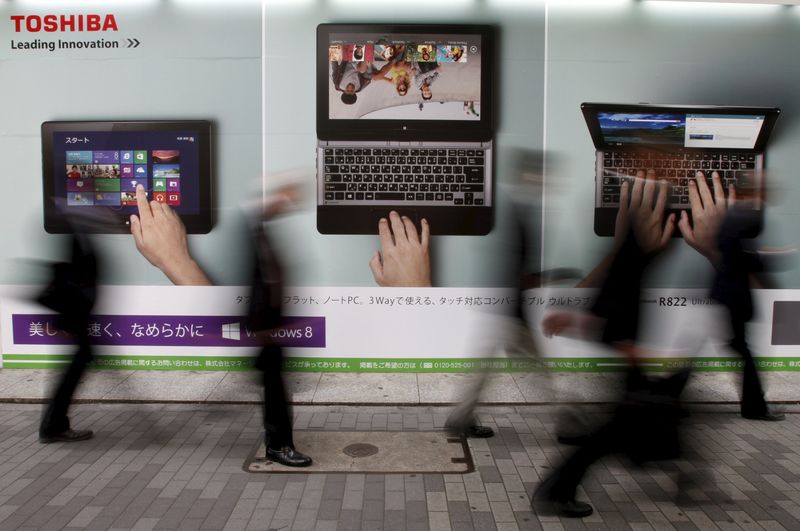By Nathan Layne and Emi Emoto
TOKYO (Reuters) - As more details emerge about years of accounts manipulation at Japanese conglomerate Toshiba Corp (T:6502), corporate governance experts say there needs to be more scrutiny of the role of the company's auditors.
Most of the blame for the $1.2 billion (768.7 million pounds) profit-padding scandal at the computer-to-nuclear group has been pinned on its senior management following a review into its accounts by a panel of independent accountants and lawyers.
The role of the auditors was not part of the investigating panel's brief. But lawyers and corporate governance experts who have analysed the 294-page report say details of exchanges between Ernst & Young ShinNihon and Toshiba executives raise questions over whether the audit firm challenged the company's accounting methods adequately.
"The Toshiba case revolves around the accounting of normal, everyday business activities. That means understanding what the auditor did is critical," said Nobuo Gohara, a lawyer hired by Ernst & Young ShinNihon to review its audit of Olympus Corp following its accounting scandal in 2011. Gohara exonerated the auditor from any legal responsibility in that case.
Ernst & Young ShinNihon and a London-based spokeswoman for Ernst & Young Global Ltd declined to comment on any of the points raised in this story, citing client confidentiality.
Toshiba declined to comment on specific points in the panel's report. On the matter of whether the auditor performed its role sufficiently, a spokesman said the company wanted to "make a judgement after carefully examining the report".
A source told Reuters on Saturday that Ernst & Young ShinNihon has launched an internal probe of its Toshiba audit, while the Japan Institute of Certified Public Accountants, a self-regulatory body for the accounting industry is also looking into it.
"UNCORRECTED MISSTATEMENTS"
One section of the report that is likely to be a focus of those reviews provides a rare glimpse into the normally private exchanges between a company and its auditor.
On January 28, 2014, two days before Toshiba had to close its fiscal third quarter its then president, Hisao Tanaka, sent a warning to the head of Toshiba's power systems company: there would be "big trouble" if it had to swallow the $396 million loss the auditor said it should recognise on a project run at U.S. nuclear unit Westinghouse.
Chief Financial Officer Makoto Kubo began a flurry of last minute discussions with Ernst & Young ShinNihon, according to the report released on July 21.
Kubo, who was also head of the company's audit committee, declined to comment through a Toshiba spokesman, citing his resignation.
The auditors accepted an updated estimate of $332 million from Westinghouse, but were holding the line there. Kubo wanted to limit the loss to $225 million, though there was no concrete basis showing why it should be this amount, the report found.
On January 30 Kubo got his wish. The auditor signed off on Toshiba's financial statement with a $225 million loss on the Westinghouse project.
The $107 million discrepancy was classified as an "uncorrected misstatement", an accepted accounting treatment used to address differences in opinion between management and auditors that is not disclosed to investors.
Some experts say a loss of around $100 million appears a somewhat large amount to be classified as an "uncorrected misstatement". It was equal to about a fourth of Toshiba's pre-tax profit in the third quarter of that year.
The report said Kubo told the panel's investigators the treatment was arranged with the auditor as what he called a "special exception" based on the condition the company could get costs down to a certain level by the fourth quarter. Ernst & Young denied this was the case, according to the report.
Hideaki Kubori, an expert on corporate investigations, said the negotiations as detailed in the report show the auditor was too quick to "yield to the company when there was any difference in view."
HIDING INFORMATION
Not everyone sees potential issues with the auditor's work here, and the panel report found Toshiba hid information and presented the auditor with materials that created "stories different from the facts."
For example, the report details correspondence in 2012 between Toshiba accounting staff in which one executive emphasized the need to make sure the auditor remained unaware internal parts transactions were being used to boost profits in the PC business.
Shin Ushijima, president of the Japan Corporate Governance Network, said the use of uncorrected misstatements in the Westinghouse case shows the auditor was exercising its judgement as to what was material.
He also notes the full loss of $332 million was recognised at the end of the fiscal year.
"As an auditor it is saying this is a misstatement, though not a material one. That's the end of it," Ushijima said.
Japan's financial regulator is expected to investigate the audit in the coming months, sources with knowledge of the matter said.
After Olympus, it ordered Ernst & Young ShinNihon and prior auditor KPMG to make business improvement plans after finding they lacked management systems to ensure proper auditing.

Experts say it's premature to forecast what action, if any, the auditor will face in this instance.